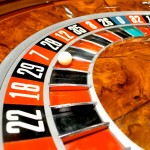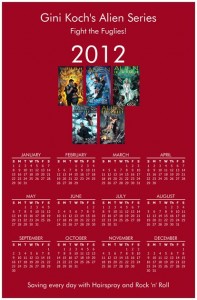 I used to see getting published as something similar to a game of roulette. If I learned to write well and finished a short story or novel, I’d place a token on the table. With each rejection, I had to remove my token and place it on a different number. Of course, as I put more tokens on the table, my chances of winning went up. It would take a long time and a lot of tokens before the odds would be worth measuring, let alone in my favor.
I used to see getting published as something similar to a game of roulette. If I learned to write well and finished a short story or novel, I’d place a token on the table. With each rejection, I had to remove my token and place it on a different number. Of course, as I put more tokens on the table, my chances of winning went up. It would take a long time and a lot of tokens before the odds would be worth measuring, let alone in my favor.
Having recently published a short story in an anthology, the odds should be going up, right? I’m not so sure. And here’s the rub: New York is still the respected place to publish, and they’re still the people with the money and the resources…when they choose to spend them on their authors. So here are the options, as I see it, with their pros and cons:
The increasingly difficult option of getting an agent and publishing with a big New York publishing house doesn’t appeal as much as it once did, but they still have their plusses. They don’t seem to have more promotional power in the e-world as anybody else, not in terms of e-world shelf space, but they have more money for promotion. The likelihood they’ll put out that money for a new author? Slim to none. So what’s the point of going there? Some of the brick and mortars are still the place people go to find books, word spreads from there, and sells go up. They’re also one of the best places for book-signings and personal promotions. Only NY is truly effective in that field. But the big wigs are all about business. The author’s share of profits is low-understandable when you consider all the costs they cover, but still low. There has been talk of interesting accounting practices among the NY groups; I don’t know if it’s true, but it makes one wary. And their distributing efficacy is starting to waver.
So, let’s go through small publishers, right? Maybe. My anthology is through a small publisher, it’s available in hardcopy and through Amazon, but it’s not being distributed in bookstores. At least, not last time I checked. I’m still waiting to see how this model plays out. One very important point to note, some small publishers are giving a much larger portion of their sales to their authors. The downturn in sales numbers may very well be offset by that percentage of writer profit. But there are a million small publishers, and while most of them are good, some exist to rip you off, and others are incompetent. Makes me think of trying to find my way through a swamp.
So, let’s all self-publish. The author makes all the profit, has complete control over his/her property, and doesn’t have to worry about bossy people. Sounds great, right? Not so much. If you self-publish, the stigma still exists that your book must be crap. For a reason. Have you looked at the mountain of self-published works out there? Much of it wouldn’t make it past the slush-pile warehouse let alone into the possible considerations pile. How does anyone sift through all of that to find your gem of a story…or is it? A writer’s group is great, but without professional critique, acceptance, and editing, how do you really know if your story is truly good enough? It’s like throwing your time, money, and reputation at a wall so you can see if it sticks. Unfortunately, if it falls flat enough times, you’d better find another name.
So, is the conclusion to give up hope? Absolutely not. I think we’ve entered a wonderful new era where any model can work if we’re aware of the pitfalls.
New York can do a lot for a beginning author, but you’d better read the fine print, have your wits about you, and be prepared in case they stick you on the back burner and you’ve got to super-manage your own publicity. They have a lot of power; they can hurt you, or make you a star. You have to be prepared for the gamble.
Small publishers give you the critique and the gatekeeper, but find one with a good track record or at least a business model you believe in. That will take research, and you’ll still have to manage most of your own publicity. They don’t have tremendous distribution power or the funds to do a lot of publicizing, but a good independent company will back you up and give you the personal help you need to kick off your career.
And self-publishing can work, but you’ve got to make a reputation for yourself. From the very beginning you’ve got to be the promotion guru. If you have the guts to throw yourself out there, garner publicity, and spend a lot of time on the publishing process, go for it. One thing, though…make absolutely sure that what you’re selling is of comparable quality with your New York competition. Not in your opinion, but in MULTIPLE, reliable peoples’ opinions.
So pick your venue, keep writing, and do your best to succeed. The chips will fall where they may.



 facebook page or your own blog, or tweet the details of our contest. If you do any of these things, leave the details (including your web address and twitter handle) with your comment. There’s a maximum of 4 entries per person (one for each method of entry). Leave a comment telling us in 25 words or less who your favorite book character is and why. See our examples below.
facebook page or your own blog, or tweet the details of our contest. If you do any of these things, leave the details (including your web address and twitter handle) with your comment. There’s a maximum of 4 entries per person (one for each method of entry). Leave a comment telling us in 25 words or less who your favorite book character is and why. See our examples below.